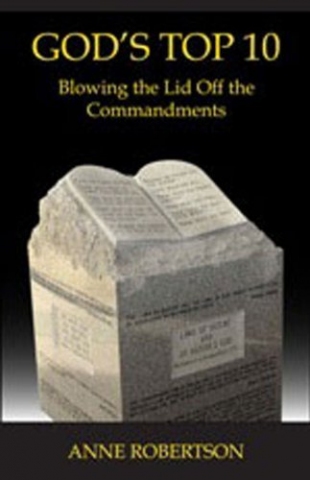Anne Robertson, a United Methodist minister of a congregation in Massachusetts and a frequent speaker and retreat leader, has written a substantive Christian examination of the broad issues addressed by the Ten Commandments. Her broad scope is evident in this comment on the First Commandment: "There are many, many gods both in our personal lives and in our culture. In their proper place, they are great blessings, gifts given to us by God in trust, in trust that we won't worship them and forget our first love. The danger is not that we love our country, but that we love our country more than God. The danger is not that we value freedom, but that we put our personal freedoms above God's will. The danger is not that we want to make a profit from our labor, but that profit becomes the thing for which we will make ultimate sacrifices. This is a commandment about the centrality of God. It is the hardest commandment to keep, but the rewards for doing so spread from ourselves to the world."
One in five U.S. voters cited "moral values" as their most important guide when they cast their ballots in the 2004 election. Robertson believes that the 10 Commandments provide a guide to ethics and to the complex decisions of our time which cannot be seen as simply black and white. In her muscular treatment of the First Commandment, for example, she discusses the bottom line, the national interest, freedom, gun control, hate speech, and the Pledge of Allegiance. You know after reading this chapter that you are in the presence of a gutsy and sober-minded Methodist who takes her Wesleyan ideal of social responsibility seriously. Robertson also knows how to burn with righteous indignation like the prophets of old.
In her treatment of the Second Commandment, which she suggests has caused the most grief and devastation, the author covers evolution and creationism, labeling people as liberal or conservative, the household gods of the church, and genetic engineering. Robertson writes about remembering the Sabbath and includes in this commandment stewardship of all creation, including the poor, the creatures, and the land. There are challenges galore in the commandment to honor thy father and mother: think about inheritance, nursing homes and infirmity, health care, ageism, surrogate parents, and our faith parents. Robertson hits high stride in her robust and hard-hitting treatment of the Sixth Commandment which forbids killing. The issues growing out of this are stem cell research, abortion, euthanasia, capital punishment, war, the taking of animal life, and hunting.
Robertson provides a sane and salutary perspective on the one area of human activity that has split Christendom: sexuality. Her chapter on the Seventh Commandment covers marriage and relationships, divorce, homosexuality and same-sex marriage, gender switching (the transgendered and transvestite), sexual abuse, pornography, prostitution, and sex trafficking. Robertson closes with this observation: "If congregations put as much energy into acts of justice as they do into acts of mercy, we could make a true and lasting difference in our world."
God's Top 10 is a book that should be cherished and studied in small groups: it offers wise Christian counsel and cogent material on the most pressing ethical issues of the day.
